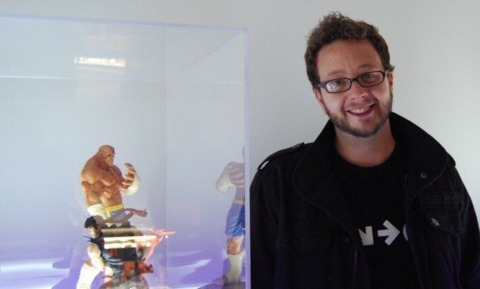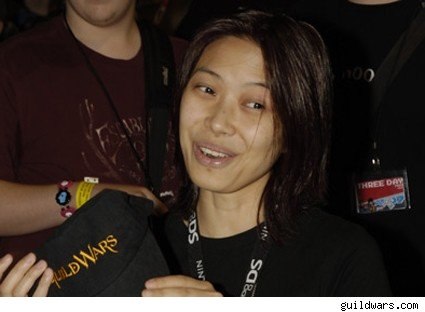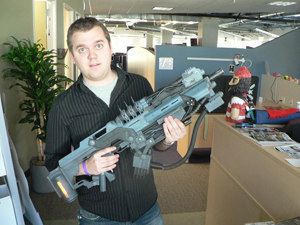Community managers sound off
PAX East 2011: Capcom, Insomniac, Naughty Dog, ArenaNet head moderators explain the diverse responsibilities of their jobs.
Who was there: Naughty Dog community manager Arne Meyer, Insomniac Games senior community manager James Stevenson, Capcom strategic director Seth Killian, and ArenaNet community manager Regina Buenaobra.
What they talked about: The discussion began with the panelists' academic upbringings. As Killian put it, there are a lot of different paths you can take to reach this position. He started out as a philosophy teacher at the University of Illinois with a lifelong love for fighting games. After making some connections with Capcom at numerous Electronic Entertainment Expos, he finally decided to "flush 10-plus years of schooling down the drain" to work on Street Fighter IV.

Buenaobra was a communications major who began her career as a lobbyist in Washington DC while also blogging about video games on the side. Meyer admitted that his schooling had very little to do with his current position since he was an economics major who later "lucked" into a job with a public relations company. Stevenson's early career took him through numerous websites and magazines, where he made a lot of contacts who helped him get his current position.
With the introductions out of the way, the four spoke about the specifics of their jobs. Buenaobra described her position as a filter for the development team. She processes the community's feedback into information the developers can actually use; just telling them that the community said their game "sucks" isn't exactly helpful. She elaborated by saying her job isn't just about posting on message boards, but it also includes organizing events, updating social media outlets, and maintaining a conversation between the community and the developers.

Meyer echoed these points, saying that he has worked with developer Naughty Dog to figure out how they want to interact with their fans, what the fans want to talk about, and how they can use this information in the development process. Unfortunately, he lamented, by the time most people get to see a game, it's so far down the development line that any sound suggestions they have would be completely impractical to implement; the ideal situation is an online beta where feedback gained can still be acted upon and the fans can experience the result firsthand.
With his extensive fighting-game background, Killian admitted that at first the community position was secondary to his desire to work on Street Fighter. As time went on he was given the freedom to define his own role within the company and discovered that his job was less community management and more company management. He became the advocate for the community's ideas within the company and works to convince the development team to listen when the community has a good idea.
Stevenson was brought into developer Insomniac to help build the website myresistance.net. From there, he started working on more outward projects, including starting a podcast, planning community days, and working as a bridge between the developers and the community. As he described it, there's a "constant confliction" between what the fans want and the realities of game development. However, it's still important to look at what is being said and distill it into something the team can use.

On the topic of the best way for fans to communicate with the developers, the panel agreed that it's a little different for every company. Each developer has its own channels of communication, including forums, community pages, and Facebook, and it takes a little searching on the fan's part to find them. Buenaobra commented that finding the strong voices in a community--those who can keep their emotions in check and convey their critiques without being disrespectful--is key. Acting belligerent or being disrespectful will only get someone tuned out.
When it comes to specific interactions with the fans, Killian reinforced that the community manager's role isn't the same as public relations. "If you just repeat the company line," he said, "even when you know it's BS, you're going to lose credibility." Meyer advocated transparency and explained that developers don't change things in a game out of spite or hate for the community. They have the best of intentions, but sometimes this message can get lost. "Just being honest is the key," Stevenson said. "It helps a lot too if the community works with us…and understands how we operate," Buenaobra added. "If [the community] understands that this is an iterative process and things are subject to change, then we are more willing to share information with them."
Looking ahead, each panelist had something different to say for future community managers. Stevenson pointed out that there is more and more need these days for good community managers. Hanging out in forums, posting constructive feedback, and just being active are all great ways to get noticed. There's always a challenge in determining what you can and cannot say as a community manager, he said, and sometimes you can work around those limitations, while other times you just have to respect them.

Meyer contributed that running a fan site is another great way to get noticed and encouraged those interested in the position to practice their writing and find their own creative voice. "These conferences are also a great opportunity to break into the industry," he said, adding that the community manager position is still a very young field with no set career paths and a variety of different roles for its members to fill.
"Every day is interesting in community management," Buenaobra said. Outside of the video game industry, community management is an even younger profession where, to put it bluntly, "they still don't know what they're doing." She also advocated the importance of cultivating a strong writing ability, be it through journalism or other means, and emphasized that there isn't a standard upward path once you get the position.
Killian admitted that luck plays a large role in getting any position in the video game industry. "I think that [community manager] is secretly one of the best jobs in the games industry," he said, "because there are a lot of things that suck about game development, and we get some of the highlights of [that]." He also encouraged current community managers to be aggressive, to go as far as they can until they can tell they're about to get their hand slapped. "With the tools that are coming out every single day, you can talk directly with people who care about your product and have a conversation with them…and those who think that's childish or kid's stuff are going to be out of a job very quickly."
Quote: "This is not only an awesome job, it's the future"--Killian on community management.
"Going on the forums is a bit like giving a colonoscopy. You go in looking for things that are wrong"--Stevenson on message boards.
Takeaway: There is not a set definition for what a community manager is or does. Everyone is different, and every company has its own way of interacting with fans. Potential community managers should focus on developing their writing style and contributing to existing communities if they want to get noticed. And once they do have the position, it's up to them to define their role in the company and ensure they are an instrument to voice the fans' opinions and not a mouthpiece for the corporate message.
Got a news tip or want to contact us directly? Email news@gamespot.com
Join the conversation